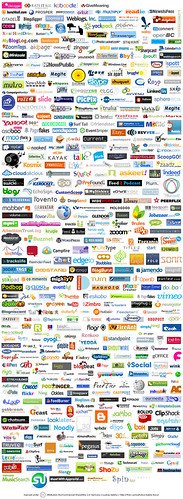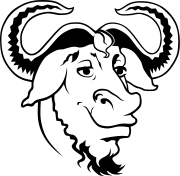
- Blogs (Apr 09, 2020)
- News (Sep 17, 2025)
- Organizations (Nov 04, 2023)
- People (Nov 03, 2023)
- Projects (Aug 08, 2024)
You can log-in or register for a user account here.
 From Imaginify, Social Software Applications (SSA) are web applications that enables people to rendezvous, connect or collaborate through a computer network or networks. Like photo games, an online "MadLibs." Take a story/poem/quote and swap in flickr images for words, letters...
From Imaginify, Social Software Applications (SSA) are web applications that enables people to rendezvous, connect or collaborate through a computer network or networks. Like photo games, an online "MadLibs." Take a story/poem/quote and swap in flickr images for words, letters...
Click 'Read More'

 Imaginify attended a Caltech lecture by Steven Johnson back in November 2004 and asked him some questions about Creative Commons, Free Culture and Open Source... Straight from BoingBoing via Lessig's blog: On April 7th 2005, the NY Public Library presented a conversation by Larry Lessig and Wilco's Jeff Tweedy, moderated by Steven Johnson, author of such books as Everything Bad is Good For You.
Imaginify attended a Caltech lecture by Steven Johnson back in November 2004 and asked him some questions about Creative Commons, Free Culture and Open Source... Straight from BoingBoing via Lessig's blog: On April 7th 2005, the NY Public Library presented a conversation by Larry Lessig and Wilco's Jeff Tweedy, moderated by Steven Johnson, author of such books as Everything Bad is Good For You.
From the EvolverProject, "It is no longer about knowing what is wrong. It is about becoming what is right. It is about integrating logic and heart, vision and will. It is about making life juicier by making good ideas real. A new world is springing up around us, of visionary politics and liberating hacks, earthly communities and galactic highs ... "new news" ... focusing on active solutions, helpful products, new social movements, and do-it-yourself designs ... open-source group-mind and creative meta-media, designed to creatively and quickly respond to our rapidly changing times ... a model for a passionate planetary culture, one jacked up on collaboration, connection, and exuberant renewal."
To Reality Sandwich, "a web magazine for this time of intense transformation. Our subjects run the gamut from sustainability to shamanism, alternate realities to alternative energy, remixing media to re-imagining community, holistic healing techniques to the promise and perils of new technologies. We hope to spark debate and engagement by offering a forum for voices ranging from the ecologically pragmatic to the wildly visionary (which, to our delight, sometimes turn out to be the one and the same). Counteracting the doom-and-gloom of the daily news, Reality Sandwich is a platform for voices conveying a different vision of the transformations we face. Our goal is to inspire psychic evolution and a kind of earth alchemy." UPDATED!
 From O'Reilly Network, "Mind Hacks is a collection of probes into the moment-by-moment works of the brain. Using cognitive neuroscience, these experiments, tricks, and tips related to vision, motor skills, attention, cognition, subliminal perception, and more throw light on how the human brain works. Each "hack" examines specific operations of the brain. By seeing how the brain responds, we pick up clues about the architecture and design of the brain, learning a little bit more about how the brain is put together."
From O'Reilly Network, "Mind Hacks is a collection of probes into the moment-by-moment works of the brain. Using cognitive neuroscience, these experiments, tricks, and tips related to vision, motor skills, attention, cognition, subliminal perception, and more throw light on how the human brain works. Each "hack" examines specific operations of the brain. By seeing how the brain responds, we pick up clues about the architecture and design of the brain, learning a little bit more about how the brain is put together."
 This comes from, "onthecommons.org." The commons is a new way to express a very old idea ¬ń that some forms of wealth belong to all of us, and that these community resources must be actively protected and managed for the good of all. The commons consists of gifts of nature such as air, water, the oceans, wildlife and wilderness, and shared assets like the Internet, the airwaves used for broadcasting, and public lands. The commons also includes our shared social creations: libraries, parks, public spaces as well as scientific research, creative works and public knowledge that have accumulated over centuries.
This comes from, "onthecommons.org." The commons is a new way to express a very old idea ¬ń that some forms of wealth belong to all of us, and that these community resources must be actively protected and managed for the good of all. The commons consists of gifts of nature such as air, water, the oceans, wildlife and wilderness, and shared assets like the Internet, the airwaves used for broadcasting, and public lands. The commons also includes our shared social creations: libraries, parks, public spaces as well as scientific research, creative works and public knowledge that have accumulated over centuries.
 A step in the right direction..."A world community of scholars, researchers, and explorers combining perspectives and insights on consciousness, human nature and the human potential..." The Knowledge Center "is a growing body of knowledge--a place to share and access our collective understanding of the nature of consciousness, the human potential, and the mysteries of our universe."
A step in the right direction..."A world community of scholars, researchers, and explorers combining perspectives and insights on consciousness, human nature and the human potential..." The Knowledge Center "is a growing body of knowledge--a place to share and access our collective understanding of the nature of consciousness, the human potential, and the mysteries of our universe."
 Straight from BloggerCon III's open node...wikipedia's definition goes like this..."Podcasting is different than broadcasting and webcasting in that it "casts" audio not by a mechanism of centrally pushing audio out to listeners, but by the mechanism of the (distributed) listeners pulling (downloading) the audio files automatically. Podcasters publish (or "podcast") audio files, even in the likeness of radio shows, but it is the individual listener who initiates the "cast" through their subscription and automatic download of the audio program.
Straight from BloggerCon III's open node...wikipedia's definition goes like this..."Podcasting is different than broadcasting and webcasting in that it "casts" audio not by a mechanism of centrally pushing audio out to listeners, but by the mechanism of the (distributed) listeners pulling (downloading) the audio files automatically. Podcasters publish (or "podcast") audio files, even in the likeness of radio shows, but it is the individual listener who initiates the "cast" through their subscription and automatic download of the audio program.
 Yesterday's Planetwork forum was a real success. It was an interesting mix of online initiative presentations with one consistent theme being the leveraging of "social" networking technologies for progressive causes. There was genuine enthusiasm for WatershedWeb, both for our watershed focus and the CivicSpace code package features...
Yesterday's Planetwork forum was a real success. It was an interesting mix of online initiative presentations with one consistent theme being the leveraging of "social" networking technologies for progressive causes. There was genuine enthusiasm for WatershedWeb, both for our watershed focus and the CivicSpace code package features...
 In the concluding paragraphs of the decision, Justice Sidney R. Thomas (9th US Circuit Court, LA) wrote: "[W]e live in a quicksilver technological environment with courts ill-suited to fix the flow of internet innovation....The introduction of new technology is always disruptive to old markets and particularly to those copyright owners whose works are sold through well-established distribution mechanisms," the court wrote. The Ninth Circuit decision is based in part on the fact that P2P networks have significant non-infringing uses, and that they can help artists earn money, The Electronic Frontier Foundation reports.
In the concluding paragraphs of the decision, Justice Sidney R. Thomas (9th US Circuit Court, LA) wrote: "[W]e live in a quicksilver technological environment with courts ill-suited to fix the flow of internet innovation....The introduction of new technology is always disruptive to old markets and particularly to those copyright owners whose works are sold through well-established distribution mechanisms," the court wrote. The Ninth Circuit decision is based in part on the fact that P2P networks have significant non-infringing uses, and that they can help artists earn money, The Electronic Frontier Foundation reports.
- Apache HTTP Server
- Audacity [audio]
- Blender [3D suite]
- Brave [browser]
- EMS Resources
- Firefox [browser]
- FreeCAD [modeler]
- GIMP.org [graphics]
- Inkscape [vector]
- Krita [painting]
- LibreOffice
- Linux Kernel
- Mattermost [team]
- MediaWiki
- Moodle [LMS]
- Mozilla Hubs
- NetNewsWire
- Nightingale [music]
- OBS Studio
- QGIS [Geo-Info-Sys]
- SeaMonkey [editor]
- Shotcut [video editor]
- Thunderbird [email]
- Thunderbird Lightning
- VLC [VideoLan]
- Wordpress [CMS]
- xiph Vorbis [ogg]
- XMPP [comm]
INTERNET ARCHIVE
WIKIMEDIA FOUNDATION
OPEN COURSEWARE
- Archive Educational
- BerkeleyX
- UCambridgeX
- ColumbiaX
- Commons
- EdX
- DelftX
- ETHx
- Encyclopedia of Life
- HarvardX
- Harvard Online
- Harvard U
- CancerCommons
- Identity Mashup
- LSEX
- Merlot
- MIT OpenCourseware
- MITX
- Neuropathy Commons
- Northwestern U
- OpenCulture
- Open Edu Global
- Open Journal Systems
- OpenStax at Rice
- Open U OER
- Oregon State U
- SchoolForge
- Stanford U
- Tree of Life (glossary)
- U of Michigan
- UTAustinX
- U of Oxford
- Wikiversity
- Yale Open Courses
• Deep Learning
• Machine Learning
• Reinforcement Learning
• Neural Network
• Artificial Intelligence
OPEN FORGES
OPEN METAVERSE
• Blender [3D Suite]
• Firestorm Viewer
• GitHub
• Hubs Foundation
• Libre3D
• Metaverse Project
• NIH 3D Print Exchange
• OpenKinect
• OpenNI2
• OpenSim
• OpenSourceVR
• PlayCanvas
• Sirikata
• Sketchfab
• Thingiverse
• 3D Warehouse
• Unity 3D
• WebGL (Moz)
• WebXR API (Moz)
• Yeggi
• YouMagine
- Arxiv at Cornell
- Arxiv Computer Research
- Arxiv Mathematics
- Arxiv NonLinear Sciences
- Arxiv Physics
- Arxiv Quantitative Biology
- Berkeley Electronic Press
- BioRrxiv
- Free Legal Resources
- MediArXiv
- Public Library of Science (PLoS)
- PLoS ONE
- PLoS Biology
- PLoS Complex Systems
- PLoS CompBio
- PLoS Genetics
- PLoS Medicine
- PLoS Systems Science
- Science Commons
- Smithsonian
- Wex Legal Dictionary
- Alternative Freedom
- Brothers Chudnovsky
- Century of Self
- Conundrum
- Design-e2
- Digital Nation
- Einstein's Big Idea
- The Elegant Universe
- Evolution
- The Facebook Dilemma
- Fritjof Capra
- Generation Like
- The Grey Video
- Growing Up Online
- How Art Made the World
- In the Age of AI
- Last Child in the Woods?
- Life Incorporated
- Merchants of Cool
- Mirror Neurons
- OurMedia
- OS Media
- The Persuaders
- Plastic Wars
- Present Shock
- RecentChangesCamp06
- Revolution OS
- Who Owns Culture?
- Definition
- MP3 7.2MB
- More A/V
- Stanford Talk
Games- Agility
- Drawing
- OS Games
- Spelling
Media Ecology- Definition
- Tetrad of Effects
Optics- Dymaxion Map
- Hubble Telescope
- James Web Telescope
- Map - Territory
- Op Art
- Virtual Globe
- Visible Earth
Systems Science- 68th Proceedings
- 67th Proceedings
- 66th Proceedings
- 65th Proceedings
- 64th Proceedings
- 63rd Proceedings
- 62nd Proceedings
- 61st Proceedings
- 60th Proceedings
- 59th Proceedings
- 58th Proceedings
- 57th Proceedings
- 56th Proceedings
- 55th Proceedings
- 54th Proceedings
- 53rd Proceedings
- 52nd Proceedings
- 51st Proceedings
- 50th Proceedings
- Retrospective 12
- Retrospective 11
- Retrospective 10
- Retrospective 09
- Retrospective 08
- Retrospective 07
- Retrospective 06




